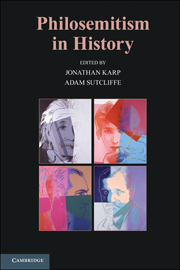Book contents
- Frontmatter
- Contents
- Notes on Contributors
- Introduction
- PART I MEDIEVAL AND EARLY MODERN FRAMEWORKS
- PART II THREE EUROPEAN PHILOSEMITES
- PART III THE CULTURAL POLITICS OF PHILOSEMITISM IN VICTORIAN BRITAIN AND IMPERIAL GERMANY
- PART IV AMERICAN PHILOSEMITISMS
- 10 Ethnic Role Models and Chosen Peoples
- 11 Connoisseurs of Angst
- 12 “It's All in the Bible”
- PART V PHILOSEMITISM IN POST-HOLOCAUST EUROPE
- Index
- References
11 - Connoisseurs of Angst
The Jewish Mystique and Postwar American Literary Culture
Published online by Cambridge University Press: 05 June 2012
- Frontmatter
- Contents
- Notes on Contributors
- Introduction
- PART I MEDIEVAL AND EARLY MODERN FRAMEWORKS
- PART II THREE EUROPEAN PHILOSEMITES
- PART III THE CULTURAL POLITICS OF PHILOSEMITISM IN VICTORIAN BRITAIN AND IMPERIAL GERMANY
- PART IV AMERICAN PHILOSEMITISMS
- 10 Ethnic Role Models and Chosen Peoples
- 11 Connoisseurs of Angst
- 12 “It's All in the Bible”
- PART V PHILOSEMITISM IN POST-HOLOCAUST EUROPE
- Index
- References
Summary
“let's all be Jews bereft.…”
Berryman, His Toy, His Dream, His Rest, 1968, “151”In October 1963, the scion of New England Puritans and nationally acclaimed poet Robert Lowell attended a symposium in New York City on Hannah Arendt's controversial new book Eichmann in Jerusalem: A Report on the Banality of Evil, which was published earlier that year. The symposium, sponsored by Dissent magazine, was attended by a number of the writers and critics known today as “the New York intellectuals,” including Irving Howe, Daniel Bell, Lionel Abel, and Alfred Kazin; also present was a veteran of the Warsaw Ghetto uprising and a former leader of the revolutionary Jewish labor Bund (Arendt herself did not make an appearance). For many in attendance the symposium was a watershed event, one of the first public airings of long-suppressed emotions about the Nazi crimes against Europe's Jews. For Lowell, a Boston Brahmin with a taste for the exotic, the event was noteworthy for other reasons. In a letter to his friend and fellow poet Elizabeth Bishop, he noted his delight at the vitality and passion of the speakers: “One was suddenly in a pure Jewish or Arabic world, people hardly speaking English, declaiming, confessing, orating in New Yorkese, in Yiddish, booing and clapping.” Having stumbled into an unfamiliar world where human speech flowed irrepressibly and where English had been transformed into “New Yorkese,” Lowell was moved to reflect on the Jewish contribution to American culture more broadly: “There's nothing like the New York Jews,” he continued.
- Type
- Chapter
- Information
- Philosemitism in History , pp. 235 - 256Publisher: Cambridge University PressPrint publication year: 2011



